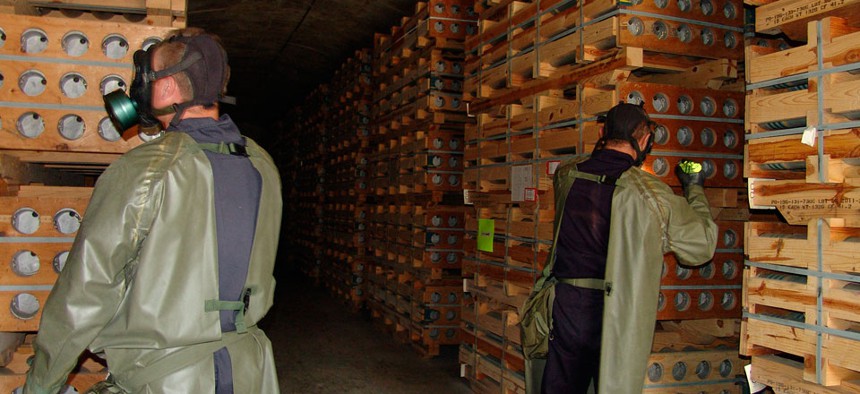Army Says It's Safe to Detonate Mustard Shells at Kentucky Depot

Workers inspect chemical agent munitions stored at the Blue Grass Army Depot in Kentucky. The Pentagon is seeking more than $700 million in fiscal 2014 funding for the agency assigned to destroy chemical stockpiles at Blue Grass. United States Army Chemical Materials Agency
It will take 38 weeks to explode 15,000 blister-agent filled munitions.
The military has made an initial determination that it is environmentally safe to detonate in excess of 15,000 mustard blister-agent filled munitions inside a special metal container at the Blue Grass Army Depot in Kentucky, the Associated Press reported on Monday.
An ultimate determination on going forward with exploding the mustard rounds is anticipated to be made before 2013 is over.
Blue Grass commander Col. Lee Hudson said it would require approximately 38 weeks to explode all of the munitions in question -- some 15,492 mustard 15mm projectiles. Doing so would save the Army from having to erect an additional facility at Blue Grass to dispose of the shells, many of which have degraded past the point where they can safely and feasibly be destroyed using chemical neutralization.
The 15mm projectiles comprise about 15 percent of the chemical arsenal awaiting disposal at Blue Grass in central Kentucky, according to a summary of the Army's environmental assessment report.
The remaining GB and VX nerve agent-filled munitions at Blue Grass would be disposed of using the chemical neutralization plant that is over two-thirds complete. Construction is anticipated to wrap up no later than 2016 and the facility is anticipated to be usable in 2019.





